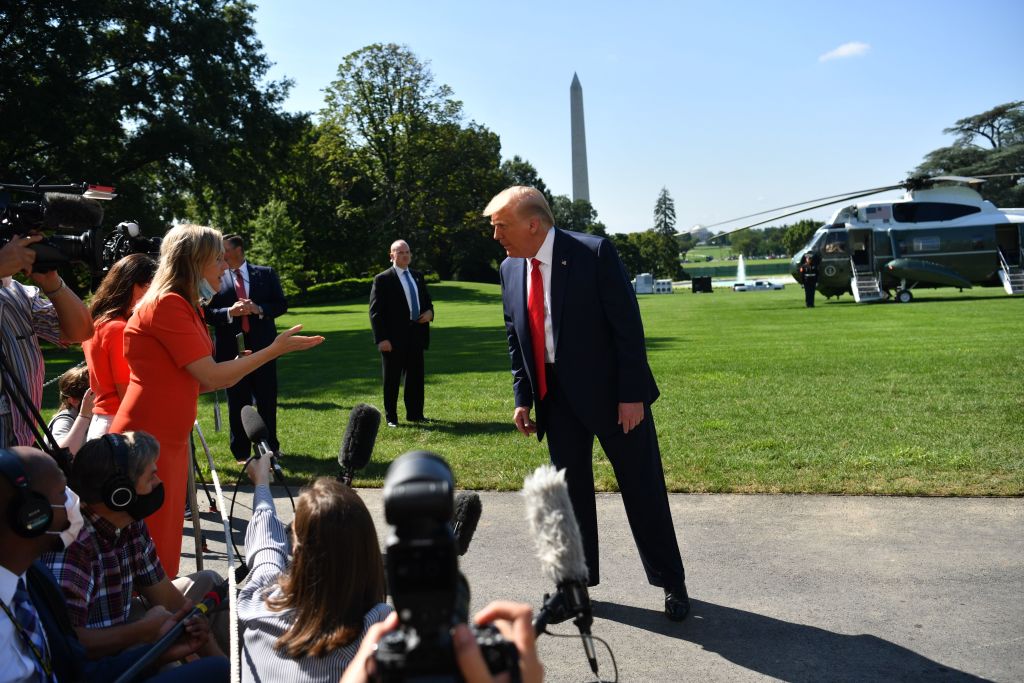Trump is giving his main RNC speech from the White House because it 'makes me feel good'


A free daily email with the biggest news stories of the day – and the best features from TheWeek.com
You are now subscribed
Your newsletter sign-up was successful
"Trailing in the polls and struggling to find a message, President Trump is leveraging one of the most powerful assets he has left — his White House office — in service of his re-election bid, obliterating the lines between governing and campaigning and testing legal boundaries in ways that go well beyond his predecessors," David Nakamura writes at The Washington Post. He has publicly roped the U.S. Postal Service and federal law enforcement into his re-election bid, and this week he will give his main Republican National Convention speech from the White House, pushing past rules or traditions on the use of the White House for partisan campaigning he already tread on during a Rose Garden speech in July.
The RNC, which begins its televised prime time show Monday night, has had to quickly adjust its convention format from in-person to virtual amid the COVID-19 pandemic. After Trump decided to give his speech from the White House, Democrats objected and the U.S. Office of Special Counsel responded that Trump and Vice President Mike Pence are exempt from the civil regulations under the Hatch Act, a decades-old law that prohibits government employees from participating in some political activities.
First lady Melania Trump will also address the RNC from the White House, giving her speech in the newly renovated Rose Garden on Tuesday. "Trump aides said that the White House venues being used are considered part of the residence, and therefore are authorized for political use," The New York Times reports, though some of "Trump's aides privately scoff at the Hatch Act and say they take pride in violating its regulations."
The Week
Escape your echo chamber. Get the facts behind the news, plus analysis from multiple perspectives.

Sign up for The Week's Free Newsletters
From our morning news briefing to a weekly Good News Newsletter, get the best of The Week delivered directly to your inbox.
From our morning news briefing to a weekly Good News Newsletter, get the best of The Week delivered directly to your inbox.
Trump himself has justified using the White House for his RNC stage as a convenience that he argued would save taxpayers money, presumably in travel costs. He also told the New York Post last week that he had passed on traveling to a federal site in Gettysburg, Pennsylvania, because speaking from the White House "makes me feel good. It makes the country feel good."
Pence will speak from another federal property, Fort McHenry in Maryland, on Wednesday, and Secretary of State Mike Pompeo will apparently address the RNC while on an official trip to Israel, an usual move for America's top diplomat. Republican National Committee chairwoman Ronna McDaniel declined to say Sunday whether taxpayers will be reimbursed for Pompeo's involvement in the RNC.
A free daily email with the biggest news stories of the day – and the best features from TheWeek.com
Peter has worked as a news and culture writer and editor at The Week since the site's launch in 2008. He covers politics, world affairs, religion and cultural currents. His journalism career began as a copy editor at a financial newswire and has included editorial positions at The New York Times Magazine, Facts on File, and Oregon State University.
-
 How the FCC’s ‘equal time’ rule works
How the FCC’s ‘equal time’ rule worksIn the Spotlight The law is at the heart of the Colbert-CBS conflict
-
 What is the endgame in the DHS shutdown?
What is the endgame in the DHS shutdown?Today’s Big Question Democrats want to rein in ICE’s immigration crackdown
-
 ‘Poor time management isn’t just an inconvenience’
‘Poor time management isn’t just an inconvenience’Instant Opinion Opinion, comment and editorials of the day
-
 Witkoff and Kushner tackle Ukraine, Iran in Geneva
Witkoff and Kushner tackle Ukraine, Iran in GenevaSpeed Read Steve Witkoff and Jared Kushner held negotiations aimed at securing a nuclear deal with Iran and an end to Russia’s war in Ukraine
-
 Pentagon spokesperson forced out as DHS’s resigns
Pentagon spokesperson forced out as DHS’s resignsSpeed Read Senior military adviser Col. David Butler was fired by Pete Hegseth and Homeland Security spokesperson Tricia McLaughlin is resigning
-
 Judge orders Washington slavery exhibit restored
Judge orders Washington slavery exhibit restoredSpeed Read The Trump administration took down displays about slavery at the President’s House Site in Philadelphia
-
 Hyatt chair joins growing list of Epstein files losers
Hyatt chair joins growing list of Epstein files losersSpeed Read Thomas Pritzker stepped down as executive chair of the Hyatt Hotels Corporation over his ties with Jeffrey Epstein and Ghislaine Maxwell
-
 Judge blocks Hegseth from punishing Kelly over video
Judge blocks Hegseth from punishing Kelly over videoSpeed Read Defense Secretary Pete Hegseth pushed for the senator to be demoted over a video in which he reminds military officials they should refuse illegal orders
-
 Trump’s EPA kills legal basis for federal climate policy
Trump’s EPA kills legal basis for federal climate policySpeed Read The government’s authority to regulate several planet-warming pollutants has been repealed
-
 House votes to end Trump’s Canada tariffs
House votes to end Trump’s Canada tariffsSpeed Read Six Republicans joined with Democrats to repeal the president’s tariffs
-
 Bondi, Democrats clash over Epstein in hearing
Bondi, Democrats clash over Epstein in hearingSpeed Read Attorney General Pam Bondi ignored survivors of convicted sex offender Jeffrey Epstein and demanded that Democrats apologize to Trump
